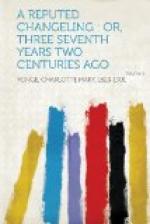“There is no need to mention that; you can call witnesses to his having been seen within these few months. It would rest with the prosecution to disprove his existence in the body, especially as the bones in the vault cannot be identified.”
“Sir,” said Charles, “the defence that would have served my innocent cousin cannot serve me, who know what I did to Oakshott. I am now aware that it is quite possible that the sword might not have killed him, but when I threw him into that vault I sealed his fate.”
“How deep is the vault?”
Mr. Lee and Dr. Woodford both averred that it was not above twenty or twenty-four feet deep, greatly to Charles’s surprise, for as a lad he had thought it almost unfathomable; but then he owned his ideas of Winchester High Street had been likewise far more magnificent than he found it. The fall need not necessarily have been fatal, especially to one insensible and opposing no resistance, but even supposing that death had not resulted, in those Draconian days, the intent to murder was equally subject with its full accomplishment to capital punishment. Still, as Colonel Archfield could plead with all his heart that he had left home with no evil intentions towards young Oakshott, the lawyers agreed that to prove that the death of the victim was uncertain would reduce the matter to a mere youthful brawl, which could not be heavily visited. Mr. Harcourt further asked whether it were possible to prove that the prisoner had been otherwise employed than in meddling with the body; but unfortunately it had been six hours before he came home.
“I was distracted,” said Charles; “I rode I knew not whither, till I came to my senses on finding that my horse was ready to drop, when I led him into a shed at a wayside public-house, bade them feed him, took a drink, then I wandered out into the copse near, and lay on the ground there till I thought him rested, for how long I know not. I think it must have been near Bishops Waltham, but I cannot recollect.”
Mr. Lee decided on setting forth at peep of dawn the next morning to endeavour to collect witnesses of Peregrine’s appearances. Sir Edmund Nutley intended to accompany him as far as Fareham to fetch little Philip and Lady Nutley, if the latter could leave her mother after the tidings had been broken to them, and also to try to trace whether Charles’s arrival at any public-house were remembered.
To her dismay, Anne received another summons from the other party to act as witness.
“I hoped to have spared you this, my sweet,” said Charles, “but never mind; you cannot say anything worse of me than I shall own of myself.”
The two were left to each other for a little while in the bay window. “Oh, sir! can you endure me thus after all?” murmured Anne, as she felt his arm round her.
“Can you endure me after all I left you to bear?” he returned.
“It was not like what I brought on you,” she said.




